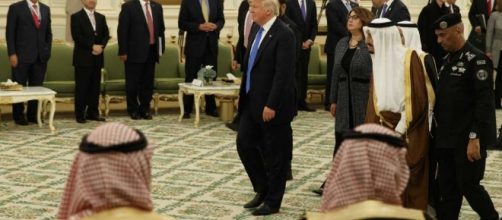#Washington and Riyadh signed defense contracts worth $ 110 billion during the visit of the US President #Donald Trump to Saudi Arabia. CNBC reported citing a #White House spokesman Sean Spicer.
.@POTUS and King Salman sign a Joint Vision Statement between the United States and Saudi Arabia pic.twitter.com/vA9vTgqKZR
— Sean Spicer (@PressSec) May 20, 2017
Billion Dollars' deal with Riyadh
"In Saudi Arabia, the president has just concluded the largest single defense deal in the American history, completing talks on an arms package worth more than $109.7 billion.
This is excellent news for US companies and people who will get jobs," Spicer wrote in the series Publications.
In Saudi Arabia @POTUS has just completed largest single arms deal in US history, negotiating a package totaling more than $109.7 billion
— Sean Spicer (@PressSec) May 20, 2017
This is huge news for US companies and American workers who will benefit #jobs https://t.co/9RarqOwVAy
— Sean Spicer (@PressSec) May 20, 2017
Earlier, Deputy White House spokeswoman Sarah Huckabee-sanders said during the briefing that today a joint statement on cooperation, as well as nine contracts and offers for the supply of arms, is expected in Riyadh. It is noted that America's total income from these contracts can reach $350 billion over ten years.
According to the White House official statement, "this package of military equipment and services is intended to demonstrate long-term support for the security of Saudi Arabia and the Persian Gulf region in the face of a threat from Iran." The concluded agreements will contribute to "expanding the capacity of the kingdom to conduct counter-terrorism operations in the region and, at the same time, reducing the burden on the American armed forces in carrying out these missions."
Commenting on the deal, the U.S.
Secretary of State Rex Tillerson at a joint press conference with Saudi Arabian Foreign Minister Adel al-Jubair stressed that Washington and Riyadh will adhere to new methods of combating the financing of terrorism.
"We will act in accordance with new approaches in the fight against the financing of terrorism and intensify cooperation in the military sphere," Tillerson said.
Senators against
The fact that in Saudi Arabia, the U.S. can make such an unprecedentedly large deal despite things he has said about the country in the past comes as a surprise. Many experts at the same time remembered that earlier Trump had spoken very harshly towards Riyadh.
Particularly, in 2011, before taking up politics, he called the Saudis the largest sponsors of terrorism in the world, and during the presidential race in 2016 accused Hillary Clinton of receiving financial support from Saudi Arabia.
It is also noteworthy that, despite Trump's statements that Saudi nationals attacked the twin towers during the 9/11 attacks, Saudi Arabia did not appear on the list of seven Arab countries that appeared on the banned list in January 2017 when Donald Trump took office.
Ignoring criticism
Meanwhile, in April 2017, US Senator Chris Murphy and his colleagues took the initiative to limit the supply of air-to-ground missiles and other weapons to Saudi Arabia. Politicians then accused Riyadh of killing civilians in Yemen and of aiding and abetting terrorist organizations, including the Islamic State *and Al-Qaeda *. The senators offered to conduct an examination before selling weapons to determine how they will be used.
"Before the transfer of air-to-ground missiles to Saudi Arabia, the president or his authorized representative undertakes to report to the relevant committee of the congress (Senate committees on international relations, on the armed forces and on intelligence) on the planned or already approved deal" , - said in the text of the document presented by the senators.
They also offered the president to address the senate with a report that will contain information on the content, cost, and purpose of any support to Washington by coalition actions led by the Saudi government in Yemen since March 26, 2015.
Nevertheless, on May 20, Tillerson said that the U.S. will continue to exert pressure on the Husit people in Yemen and that it will be facilitated by the weapons that the U.S. sells to Saudi Arabia.
"The rebels in Yemen, those who overthrew the government, must understand that they can not constantly support this struggle, can not win by military means. We will continue to exert pressure on them," the Secretary of State of the United States said at the press conference in Riyadh.


